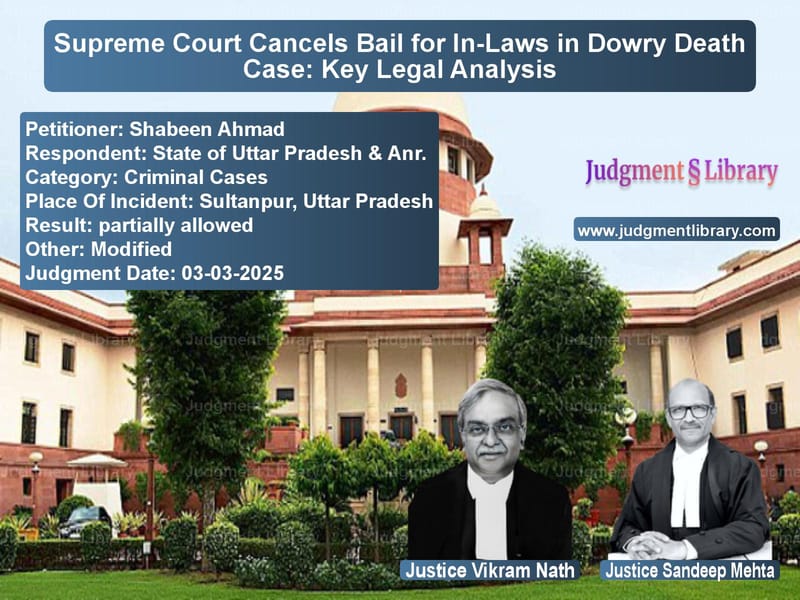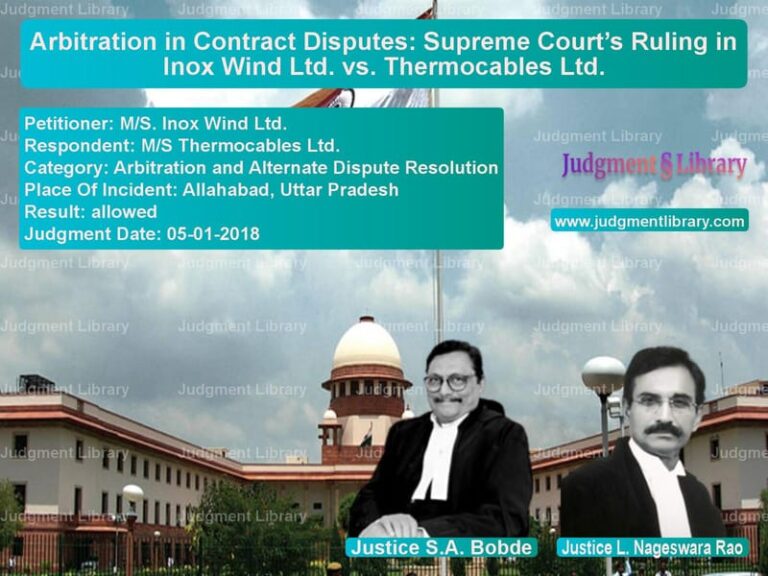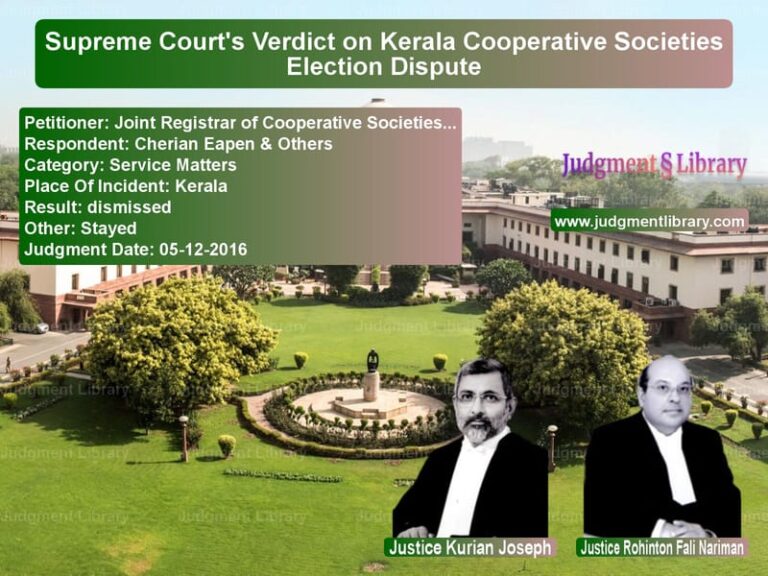Supreme Court Cancels Bail for In-Laws in Dowry Death Case: Key Legal Analysis
The Supreme Court of India has ruled on a crucial case involving allegations of dowry death and cruelty under Sections 498A and 304B of the Indian Penal Code, along with Sections 3 and 4 of the Dowry Prohibition Act, 1961. The case involved the tragic death of Ms. Shahida Bano, who was found dead in her matrimonial home under suspicious circumstances. The primary accused included her husband and in-laws, who allegedly harassed her for dowry.
Background of the Case
The case originates from FIR No. 0032/2024, registered at Police Station Kotwali Nagar, District Sultanpur, Uttar Pradesh. The FIR was lodged by Shabeen Ahmad, the brother of the deceased, alleging that the in-laws of his sister subjected her to continuous harassment over dowry demands. Shahida Bano was married to Accused No.1, Sami Khan, on February 7, 2022. Soon after the marriage, her in-laws, including her father-in-law (Mukhtar Ahmad), mother-in-law (Tara Bano), and sisters-in-law (Saba and Ayasha), began demanding a “Bullet” motorcycle, which was eventually given in Shahida’s name. Later, they allegedly demanded a car, but the victim’s family could not afford it.
The FIR states that on January 22, 2024, Shahida’s father received a call from her father-in-law, asking him to come immediately. Upon reaching the matrimonial home, they found Shahida’s body with a dupatta around her neck, tied to a ceiling fan. Notably, her knees were still touching the bed, raising suspicions about the nature of her death.
Post-Mortem Findings
The autopsy conducted on January 23, 2024, revealed several ante-mortem injuries, including contusions on the head and neck, along with a distinct ligature mark. The report concluded that the cause of death was “asphyxia due to ante-mortem strangulation,” ruling out suicide and suggesting foul play.
Trial Court Proceedings
Based on witness statements and forensic findings, the Trial Court rejected the bail applications of the accused, citing:
- The unnatural death occurring within seven years of marriage, triggering Section 304B IPC (dowry death).
- Consistent allegations from family members that the in-laws harassed and physically assaulted Shahida.
- The post-mortem report confirming strangulation.
High Court’s Decision to Grant Bail
Aggrieved by the Trial Court’s ruling, the accused approached the Allahabad High Court (Lucknow Bench), which granted bail to the in-laws on different dates in 2024, citing:
- Lack of prior criminal records of the accused.
- Women accused (mother-in-law and sisters-in-law) deserved leniency.
- The accused had cooperated with the investigation.
Supreme Court’s Examination of Bail Orders
Challenging the bail granted by the High Court, the victim’s brother, Shabeen Ahmad, approached the Supreme Court, arguing that the bail orders overlooked key evidence. The Supreme Court examined the evidence and observed:
“The deceased’s body bore multiple ante-mortem injuries, including contusions on the head and neck, which indicate physical assault before death. The presence of a ligature mark and the post-mortem’s conclusion of asphyxia due to strangulation further refute the theory of suicide.”
The Court highlighted the following crucial aspects:
- The accused had a clear history of harassing the deceased over dowry demands.
- There was a consistent pattern of cruelty, including physical and mental torture.
- Dowry-related violence remains a serious societal issue, requiring stringent judicial scrutiny.
Supreme Court’s Final Verdict
After considering the evidence, the Supreme Court ruled:
- Bail for the father-in-law (Mukhtar Ahmad) and mother-in-law (Tara Bano) was cancelled. They were directed to surrender immediately, failing which law enforcement would take them into custody.
- Bail for the sisters-in-law (Saba and Ayasha) was upheld. The Court noted their comparatively lesser role in the case and their personal circumstances (one recently married and the other a student).
“Allowing alleged prime perpetrators of such heinous acts to remain on bail, where the evidence indicates they actively inflicted physical, as well as mental, torment, could undermine not only the fairness of the trial but also public confidence in the criminal justice system.”
Key Takeaways from the Judgment
- The Supreme Court reaffirmed the stringent legal standard under Section 304B IPC, emphasizing that any unnatural death of a married woman within seven years of marriage, coupled with evidence of dowry harassment, raises a presumption of culpability against the accused.
- The Court underscored that granting bail in serious cases like dowry deaths must be approached with extreme caution.
- It clarified that while some leniency could be given based on individual circumstances, the primary accused should not be allowed to remain free.
Conclusion
The ruling in this case reinforces the judiciary’s commitment to combating dowry-related violence. By revoking the bail of the parents-in-law while allowing limited relief for the sisters-in-law, the Supreme Court has ensured a balanced approach—protecting the victim’s family’s right to justice while considering individual roles in the crime. This judgment serves as a crucial precedent in dowry death cases, sending a strong message about the gravity of such offences.
Petitioner Name: Shabeen Ahmad.Respondent Name: State of Uttar Pradesh & Anr..Judgment By: Justice Vikram Nath, Justice Sandeep Mehta.Place Of Incident: Sultanpur, Uttar Pradesh.Judgment Date: 03-03-2025.
Don’t miss out on the full details! Download the complete judgment in PDF format below and gain valuable insights instantly!
Download Judgment: shabeen-ahmad-vs-state-of-uttar-prade-supreme-court-of-india-judgment-dated-03-03-2025.pdf
Directly Download Judgment: Directly download this Judgment
See all petitions in Dowry Cases
See all petitions in Domestic Violence
See all petitions in Murder Cases
See all petitions in Judgment by Vikram Nath
See all petitions in Judgment by Sandeep Mehta
See all petitions in partially allowed
See all petitions in Modified
See all petitions in supreme court of India judgments March 2025
See all petitions in 2025 judgments
See all posts in Criminal Cases Category
See all allowed petitions in Criminal Cases Category
See all Dismissed petitions in Criminal Cases Category
See all partially allowed petitions in Criminal Cases Category







